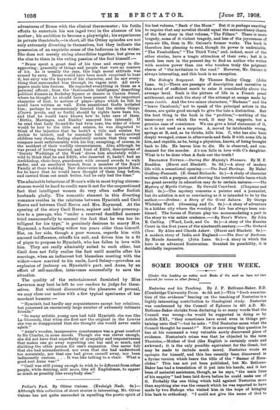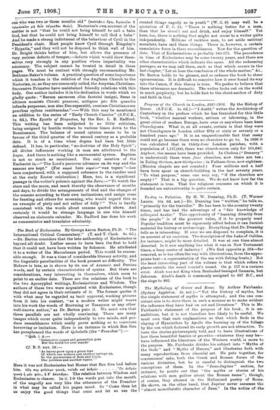SOME BOOKS OF THE WEEK.
[Under this heading we notice such Books of the week as have not been reserved for review in other forms.] Nestorius and his Teaching. By J. F. Bethune-Baker, B.D. (Cambridge -University Press. 4s. 6d. net.)—This "fresh examina- tion of the evidence" bearing on the teaching of Nestorius is a highly interesting contribution to theological study. Nestorius was condemned by the Council of Ephesus in 431 A.D. Mr. Bethune-Baker shrinks from declaring in so many words that the Council was wrong—he would be supported in doing so by Article XXI., "they sometimes have erred even in things per- taining unto God"—but he asks : "Did Nestorius mean what the Council thought he meant ? " Now in answering this question he has at his command a very valuable newly discovered piece of evidence. Nestorius's crime was that he objected to the term Theotokos,—Mother of God (the English is certainly crude and awkward; it is the only possible equivalent for the Greek, but may be made to include much more). Nestorius wrote an apologia for himself, and this has recently been discovered in a Syriac version which bears the title of the "Bazaar of Hera- elides." This has not yet been published, but Mr. Bethune- Baker has had a translation of it put into his hands, and it has been of material assistance, though, as he says, "the main lines of his enquiry" had been laid down before he could make use of it. Probably the one thing which told against Nestorius more than anything else was the remark which he was reported to have made by two Bishops who visited him, in the hope of bringing him back to orthodoxy. "I could not give the name of God to
one Who was two or three months old" (roaakcis
• ekti;jvcaor ph
klv Aheriffai Oar). Nestorius's own account of the matter is not "that he could not bring himself to call a babe God, but that he could not bring himself to call God a babe." And-he made a strong indictment of the behaviour of Cyril in the President's chair. Most people know Cyril through Kingsley's "Hy-patia," and they will not be disposed to think well of him. Dr. Bright thinks better of him, but allows the presence of very serious defects of temper,—defects which would show them- mires .very strongly in any position where impartiality was necessary. The subject cannot be treated in detail in these pages. We must be .content with strongly recommending Mr. Bethune-Baker's volume. 'A practical question of some importance which it touches is the relation of the Anglican Church to the Nestorian, or, as they are commonly called, the Assyrian, Christians. Saccessive Primates have maintained friendly relations with this body. Our author includes it in his dedication in words which we gladly quote : "Raman sacrarum ohm fautrici insigni, Seras in ultimos nomivis Christi praeconi, antiquos pro fide quandiu infanda perpessae, non sine Dec superstiti, titanium Christianorum precibns opibus restituendae."—With this may be mentioned an addition to the series of "Early Church Classics" (S.P.C.K., Is. &I.), The Epistle of Diognetus, by the Rev. L. B. Radford. This writing has been subjected to no little criticism, being assigned by hostile writers to various times .down to the Renaissance. The balance of sound opinion seems to be in favour of the third quarter of the second century as a probable date. It is of a time when dogma had been but little defined, It has, in particular, "no doctrine of the Holy Spirit"; all divine influences working in man are attributed to the Logos. And there is nothing like a sacramental system. Baptism is not so much as mentioned. The only mention of the Eucharist is,—" The Lord's passover advances on its way and the seasons are kept." (For swot here snpoi—" wax tapers "—has been conjectured, with a supposed reference to the candles used at. the early Easter celebration.) Here, too, is a significant passage in the writer's polemic against the Jews :—" To watch the stars and the moon, and mark thereby the observance of months and days, to divide the arrangements of God and the changes of the seasons according to their own inclinations, and assign some for feasting and others for mourning, who would regard this as an example of piety and not rather of folly ? " This is hardly consistent with the words about seasons quoted above. And certainly it would be strange language in one who himself observed an elaborate calendar. Mr. Radford has done his work as commentator and translator admirably.























































 Previous page
Previous page